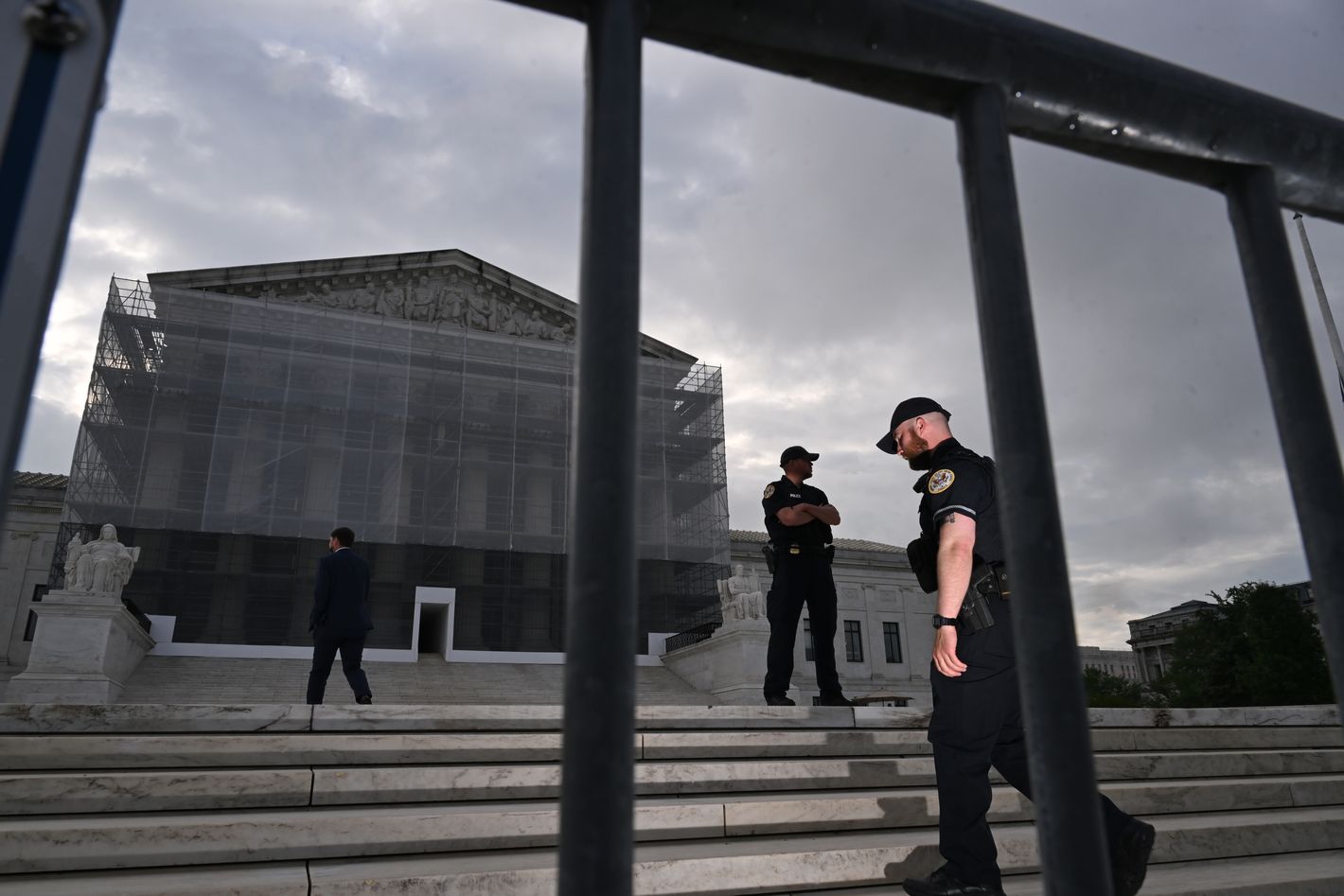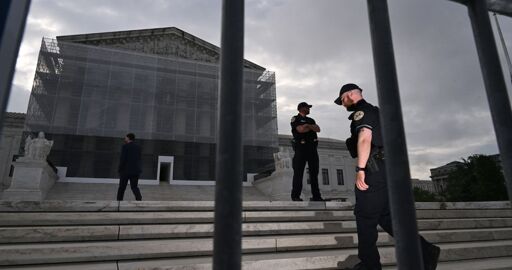 Photo: Matt McClain/The Washington Post/Getty Images
Photo: Matt McClain/The Washington Post/Getty Images
The twice-annual meeting of the Judicial Conference is, historically, dry as dust. Overseen by Chief Justice John Roberts, the gathering of federal judges from across the country meets twice a year and typically concerns itself with budget or procedures. But at the most recent gathering last week on Tuesday, Roberts was subject to unusually stern rebukes by two guest speakers: Democratic representatives Hank Johnson and Jamie Raskin of the House Judiciary Committee.
In remarks before the assembled judges, both members accused the Supreme Court of enabling President Donald Trump’s attacks on the rule of law by using the so-called shadow docket — a slate of fast-tracked proceedings that don’t get a full hearing or explanation that is sometimes more politely referred to as the “emergency docket” — to swiftly overrule lower courts that rule against the administration. The result of quietly backing Trump this way, Johnson said, according to Bloomberg Law, is “an even-more reckless and unchecked executive while challenges to [the president’s] overreach remain pending.” He added that even if the Court eventually ruled against the administration in hearing the shadow-docket cases in full, it would be “impossible to undo the damage that will have been done to our democracy.”
The Trump administration currently faces more than 300 legal challenges to its policies and has admitted — when pressed by Justice Amy Coney Barrett during Supreme Court oral arguments — that it believes it doesn’t always have to follow lower-court decisions. Meanwhile, the Supreme Court has backed the Trump administration on the shadow docket 26 out of 28 times, according to a recent NBC News tally.
According to a source present at the Judicial Conference, Roberts listened impassively as the lawmakers spoke and thanked them for their presentation. Less than a week later, on Monday, an unsigned majority of the Supreme Court voted to let Trump fire a commissioner of the Federal Trade Commission, overruling two lower courts that had each cited 90 years of precedent in ruling that he didn’t have the power to do so. “Our emergency docket should never be used, as it has been this year, to permit what our own precedent bars,” Justice Elena Kagan wrote in a bracing dissent, which was joined by the two other Democratic appointees. “Still more, it should not be used, as it also has been, to transfer government authority from Congress to the President, and thus to reshape the Nation’s separation of powers.” As Kagan suggested, the Court was once again bending normal order to do Trump’s bidding. In doing so repeatedly, the justices have undermined lower courts and the power of the judiciary itself in what a previous dissent by Justice Sonia Sotomayor plainly described as “rewarding lawlessness.”
In late August, Justices Brett Kavanaugh and Neil Gorsuch even suggested that it was other federal judges themselves, not the administration, who were defying the rule of law. “Lower court judges may sometimes disagree with this court’s decisions, but they are never free to defy them,” Justice Gorsuch wrote in an opinion Kavanaugh joined about the Trump administration’s cancellation of $800 million in research grants. To point a finger at their colleagues, rather than the administration, added insult to injury. “The message it sends to lower courts is that the Supreme Court will bend over backward to protect its prerogatives,” said Georgetown law professor Stephen Vladeck, who wrote a book about the shadow docket.
In early September, a dozen lower-court judges anonymously told NBC News that the Supreme Court’s quick reversals of their decisions, paired with a lack of reasoning and guidance to lower courts (customary when the Court makes law-shifting moves), work not only to further Trump’s agenda but to bolster his claim that the judiciary at large is biased against him. Only the Supreme Court can be objective in this formulation; how convenient that it keeps agreeing with Trump. At a time when Trump frequently trashes individual judges by name for ruling against his administration and Stephen Miller repeatedly declares a “judicial coup” almost every time a judge checks the executive, some judges said they felt “thrown under the bus.” One told NBC, “It’s almost like the Supreme Court is saying it is a ‘judicial coup.’”For the normally tight-lipped corps of elite lawyers to speak out, even anonymously, suggests matters are grim. “Those complaints should be the warning signs of a five-alarm fire,” Vladeck told me. “We don’t see federal judges publicly criticizing the court’s behavior, ever.”
So far, Roberts has played his cards closer, seemingly saying as little as possible. (Justices don’t even have to sign their names to shadow-docket orders.) In March, when Trump began fulminating about impeaching a judge who blocked his attempt to use the Alien Enemies Act to deport hundreds of Venezuelans, Roberts issued a terse statement: “It has been established that impeachment is not an appropriate response to disagreement concerning a judicial decision. The normal appellate review process exists for that purpose.” It was technically correct, but not exactly a stirring defense.
Why the Supreme Court is clearing the way for many of Trump’s unprecedented actions without waiting for the standard processes of lower-court challenges to play out is an open question. The answer may be simple: that the majority simply agrees with what the administration is doing even if it undermines their own precedent. The conservative justices may also believe that the Trump administration will not challenge their own authority.
Trump has insisted he would never defy the Supreme Court, and as the conservative justices grow more permissive it is unclear if this promise will be directly tested. I asked Vladeck if he thought Roberts — a self-style institutionalist — was preemptively avoiding conflict with the administration to avoid learning how little power he has. It is possible, Vladeck replied. “But if so, what are you saving your fire for?”
In the meantime, Trump’s Department of Justice is so unconcerned with the lower courts that it has taken to outright lying to judges. Over Labor Day weekend, lawyers for the DOJ were forced to explain, in D.C. federal district court, the justification for dragging over 300 children from Guatemala out of their beds for immediate deportation. Unlike the notorious case of the Venezuelan migrants deported to the CECOT prison in El Salvador, in March, a federal district judge managed to hit the brakes and temporarily prevent the children’s removal. In an emergency hearing, the DOJ attorneys claimed these children’s parents had asked for them to be sent back to their home country.
Shortly after the judge’s ruling, Stephen Miller claimed in an X post that “the Biden judge is effectively kidnapping these migrant children and refusing to let them return home to their parents in their home country.”
The story fell apart quickly. Guatemala’s attorney general announced that the vast majority of the children’s parents couldn’t even be located. And an unnamed whistleblower filed a complaint with Congress, saying that the administration had lied in at least one other way: saying that the children met the qualification for deportation when in fact at least 30 of them were known to be vulnerable to abuse and trafficking.
On September 18, a Trump-appointed judge, Timothy J. Kelly, reiterated that the children could not be deported, at least for now, writing that the government’s story “crumbled like a house of cards.”
There will likely be no consequences for the government’s choice to lie to a judge. In the case of the Venezuelan deportees, in which the same lead attorney was shown to mislead the court, Judge James E. Boasberg wrote a 46-page opinion saying there was probable cause to hold the DOJ lawyers in criminal contempt, noting that members of the administration had “intimated that they had defied the Court’s Order deliberately and gleefully.” But two Trump appointees on the D.C. Circuit subsequently overruled him, blocking any chance of accountability.
Only days before he heard that now-infamous case, at an earlier Judicial Conference this year Boasberg reported to Roberts that his colleagues were worried about Trump’s DOJ ignoring or defying judicial orders. The conversation was leaked to the Federalist and later became the basis of a misconduct complaint filed against Boasberg by Attorney General Pam Bondi, who did not even bother citing any specific misconduct. The point was to create a vague and discrediting aura of controversy.
Beyond questions of their authority, lower-court judges are also facing real danger. According to the U.S. Marshals Service, threats to judges continue to spike in the second Trump presidency. On a recent visit to a federal courthouse, I found myself face to face with a skeptical-looking Marshal. An email confirming an appointment to see a federal judge was insufficient; neither would a phone call upstairs satisfy. I didn’t find the caution unreasonable. Supreme Court justices, who are used to being household names, have their own dedicated security, but lower-court judges typically do not. “It’s clearly a brave new world when it comes to security, judges included,” Judge Jeffrey S. Sutton said at last Tuesday’s Judicial Conference, reiterating the need for more funding for security.
At the previous conference, in March, the group’s chair of judicial security worried that the White House might move to revoke the protection of the Marshals themselves, who officially answer to the president. That hasn’t happened yet, but the Republican-controlled Congress doesn’t seem particularly troubled by the new risks to federal judges. Their short-term funding bill, introduced last week, refused a request to pay for more security for the lower courts, though it did allocate tens of millions of dollars to protect the Supreme Court and members of Congress themselves.
“I think judges have concerns about our safety,” one federal judge recently told me. “But I don’t think it’s had a chilling effect on our decisions. We are still doing our jobs.”
More on politics
Shutdown Layoffs Threat Shows Limit of GOP’s Fear TacticsWhat We Know About the Dallas ICE-Facility ShootingMike Johnson May Want a Government Shutdown to Avoid Epstein Files Vote
From Intelligencer - Daily News, Politics, Business, and Tech via this RSS feed

